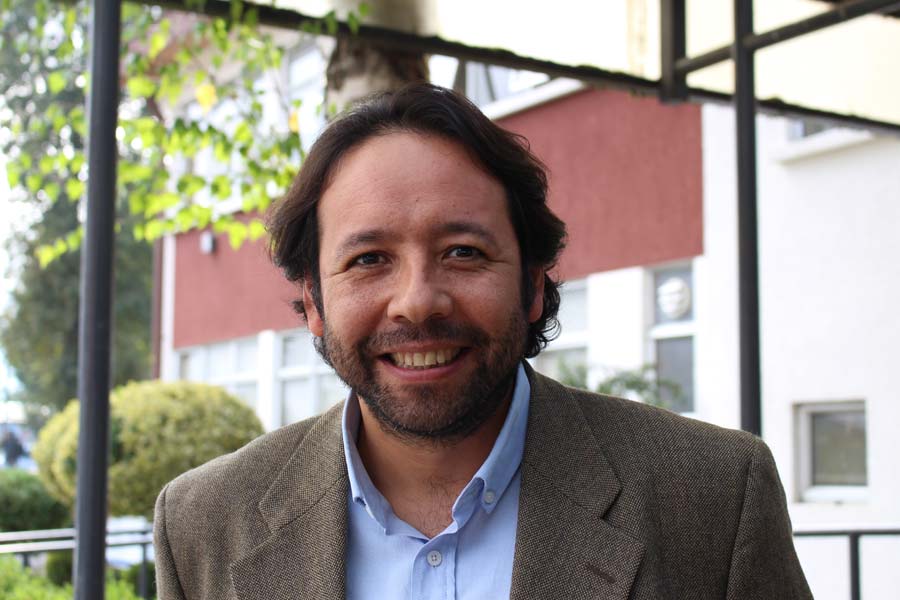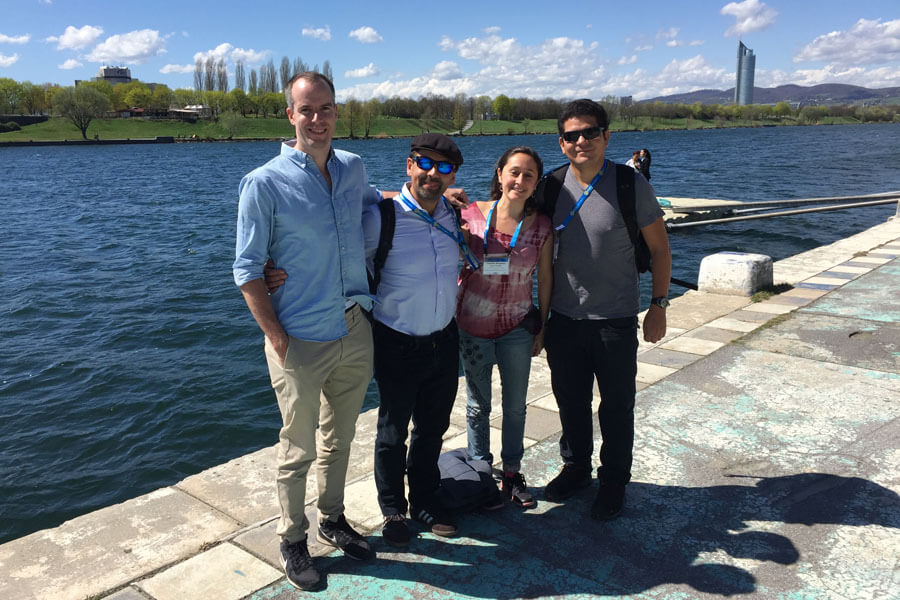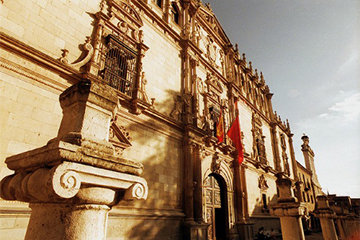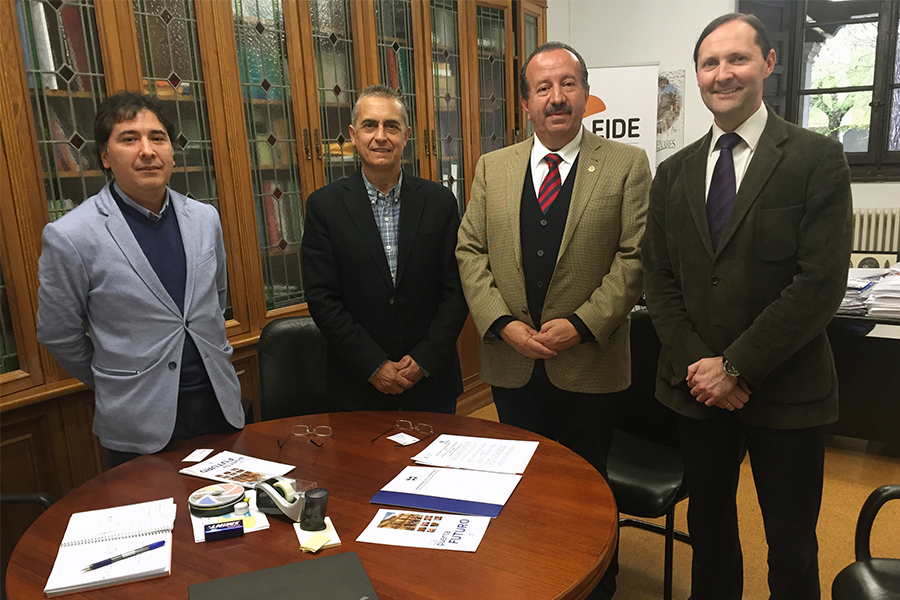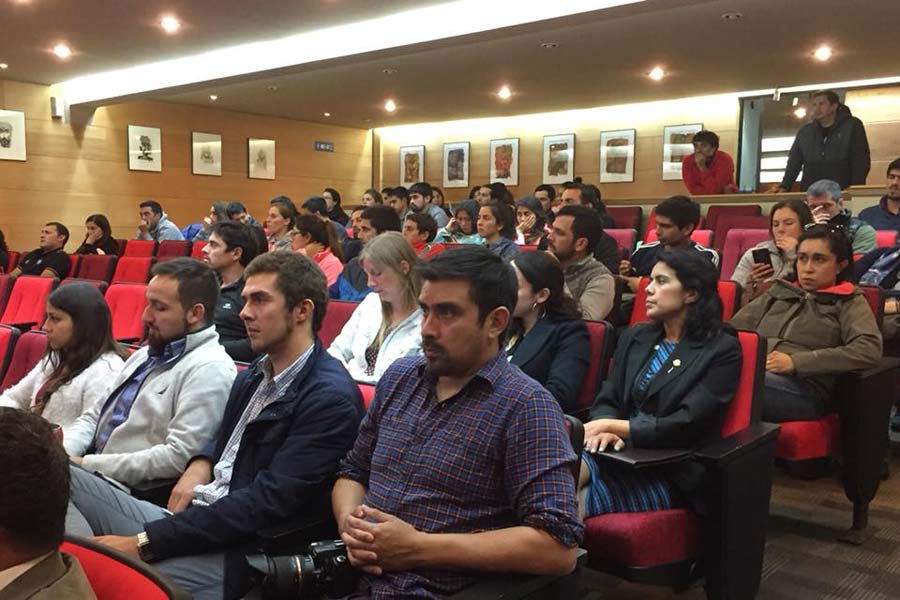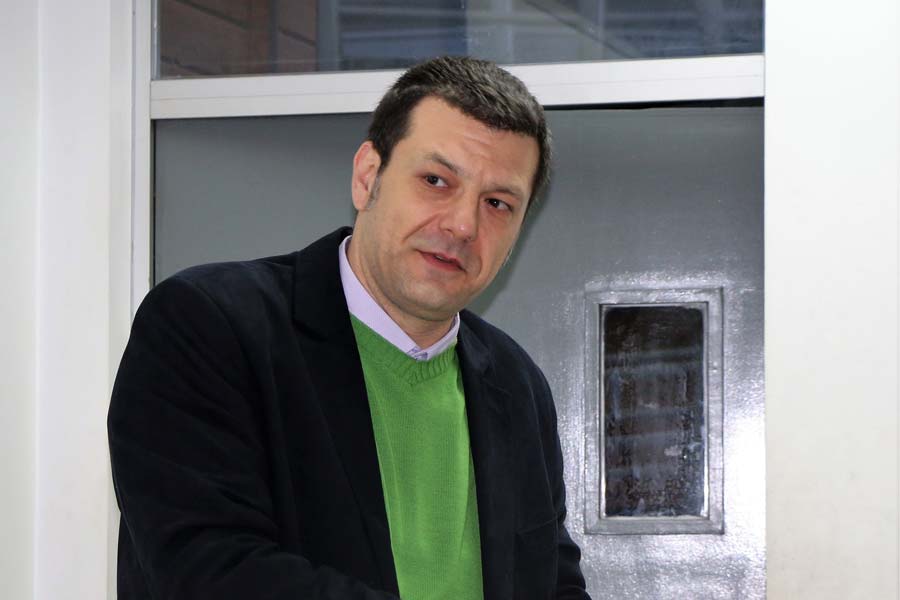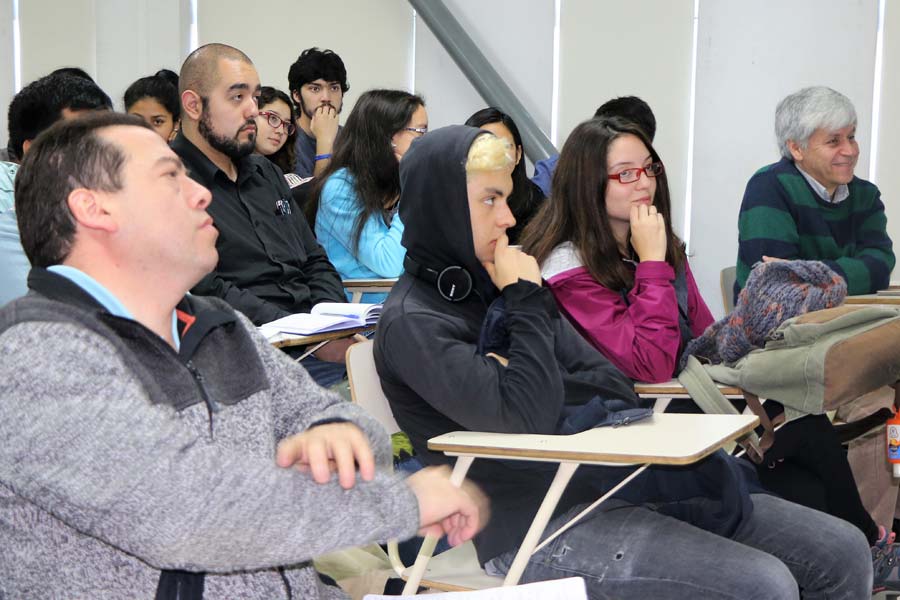|
In the latest annual meeting of the American Society for Cell Biology, the director of the Chemical Engineering Department at the UFRO, Dr. Jorge Farías Avendaño, was appointed ambassador of the society for Chile. |
Dr. Jorge Farías is a regular member of the American Society for Cell Biology (ASCB) since 2008 and the director of the Chemical Engineering Department at the Universidad de La Frontera and now assumed the role of ambassador of the ASCB in Chile. His mission is to strengthen the link between researchers and the North American Society that promotes international research collaboration in the fields of cellular and molecular biology, the training of advanced human capital and the strengthening of policies related to research. “For the University it is very important to actively participate in these activities because we can show us in an international context and that strengthens our doctoral programs, such as the Doctorate in Science with specialization in Applied Cellular and Molecular Biology and the Doctorate in Natural Resources Science, which both recently achieved international accreditation”, Dr. Jorge Farías stated. UFRO PIONEER Until the year 2017, Dr. Jorge Farías was the only UFRO researcher that has been part of this Society. He presented the recent graduate of the Doctorate in Science with specialization in Applied Cellular and Molecular Biology, Elías Figueroa, to the Society, who is now part of the ASCB in the “Young Researcher” category. Part of the requirements to enter the Society are to develop relevant research and to have publications in this thematic field. The group holds various Nobel Prizes and concentrates the main research centers of North American universities. The collaborative network and work within this Society also grew since 2017, when it established an alliance with the European version of this society, the European Molecular Biology Organization (EMBO). For this reason, Dr. Farías invites his colleagues at the Universidad de La Frontera to get to know and join this scientific Society. Written by: Daphne Bormann
Faculty of Engineering and Science |
|
The UFRO teacher, Dr. Mauricio Zambrano-Bigiarini, participated in this scientific event, which is considered as the most important one on Earth Sciences in Europe, and presented his study that describes the use of satellite precipitation and evapotranspiration products to assess the spatial extension, severity and duration of the megadrought that has affected the South-Center Regions of Chile. |
The academic of the Civil Engineering Department at the Universidad de La Frontera, Dr. Mauricio Zambrano-Bigiarini, participated in the Conference “European Geosciences Union (EGU) 2018” in Vienna, Austria, in order to disseminate his research studies. The scientific event is considered to be the most important one on Earth Sciences in Europe and the UFRO teacher presented his study called “Using remote sensing estimates of precipitation and evapotranspiration to assess the spatial characteristics of Chilean megadrought” that describes the use of satellite precipitation and evapotranspiration products to assess the spatial extension, severity and duration of the megadrought that affected the South-Center Regions of Chile over the past decade. The study is the result of a collaboration between Dr. Zambrano-Bigiarini and the Center for Climate and Resilience Research (CR2) of the University of Chile and follows a line of research on water and extreme events. COLLABORATION At the same time, he also participated in three other presentations in which he is actively collaborating thanks to the partnerships he has established with experts of other institutions in Chile and abroad. One of these studies is called “Assessment of water yield under global change scenarios in a mediterranean rainfed watershed dominated by exotic tree plantations” and led by Dr. Mauricio Galleguillos of the University of Chile. The purpose of this project is to investigate the effects the substitution of native forests by forest plantations has on the availability of water. Another project is called “The CAMELS-CL dataset: catchment attributes and meteorology for large sample studies–Chile dataset” and led by the postdoctoral researcher Camila Álvarez-Garrretón of the Chilean Universidad Austral. The project describes the first dataset about geomorphological and hydro-meteorological characteristics for Chile. And the third project is called “Evaluating satellite-based rainfall estimates to support low flow modelling in data scarce Andean catchments at different latitudes of Chile” and led by the researcher Alexandra Nauditt of the Technical University of Cologne, Germany. The third project addresses the use of different satellite products for the hydrological simulation of different watersheds of high socio-economic relevance for Chile. The project is the result of a collaboration between the UFRO Civil Engineering Department and the Institute for Technology and Resources Management in the Tropics and Subtropics (ITT, Cologne, Germany). REPRESENTATIVES Dr. Zambrano-Bigiarini and the researcher Camila Álvarez Garretón were the only representatives for Latin America in the "splinter meeting" of the work group "Drought in the Anthropocene" of the initiative Panta Rhei of the International Association of Hydrological Sciences, a group that is led by Anne Van Loonm, a researcher at the University of Birmingham, UK, and whose group members could collaborate with Master´s students in the study of socio-economic impacts of the megadrought in Chile. After the EGU 2018 Conference, Dr. Mauricio Zambrano-Bigiarini went to Cologne, Germany, to meet with researchers of the Technical University of Cologne to discuss the advances of their current research projects and to plan the rest of the year 2018. Escrito por: Daphne Bormann
Faculty of Engineering and Science |
|
The joint work since 2010 has been formalized by this Agreement that made academic collaboration possible and offers new opportunities of linkage. |
The Universidad de Alcalá (UAH) in Spain is among the best higher education institutions in Spain and the most ancient ones in Europe. It also is the most current partner of the Universidad de La Frontera, after the signing of a Collaboration Agreement. The Agreement is a formalization of joint work that dates back to 2010 and that has created the possibility of academic collaboration. It has been signed by the Vice-rector of International Affairs, Miguel Angel Sotelo, of the UAH, in the presence of the Dean and the Vice-dean of the Faculty of Agricultural and Forestry Science of the UFRO, Rodolfo Pihán and Adison Altamirano. The signing of the Agreement was one of a series of activities at that university in order to boost new actions of cooperation. “This is an important Agreement, since it is the formalization of joint work that is ongoing since more than five years, with permanent exchange of academic staff, research, projects and publications, and also at the postgraduate level. Now, new international cooperation possibilities open up with a university of prestige and tradition and which is one of the best and most ancient ones in Spain”, the dean Rodolfo Pihán stated. The UFRO director of International Affairs, Dr. Pamela Leal, appreciates this Agreement that contributes to “the internationalization of our University by strengthening joint collaboration and opens new opportunities for teacher and student mobility. It also creates the possibility to increase the productivity in publications and in the access to international funds for research. Apart from that, it also strengthens our networks with Spain, through the AUIP (Iberoamerican University Association for Postgraduate Studies), which both institutions are part of.” MORE INTERNATIONAL LINKS On the basis of this Agreement, the expectation is to promote new joint actions oriented towards joint research, the professional training, teacher and student mobility, and others. The link with the UAH has been made mainly through the Faculty of Agricultural and Forestry Science of the UFRO, and the academic relation with one of the most renowned professors in Spain, Dr. José María Rey Banayas, who also is one of the creators of the International Foundation for Ecosystem Restoration (FIRE). “One of the driving forces of this alliance is Dr. Rey Benayas with whom we were working on a MEC Project of the National Fund for Scientific and Technological Development (FONDECYT), in which we materialized a series of teaching, research and outreach and community engagement activities. Apart from that, we have a student of the Master in Natural Resource Management who went to Spain for his studies. This Agreement opens doors in the collaboration with other fields of the UFRO that can join us, especially through academic exchange and cotutelle doctorates, which they are very interested in”, Dr. Adison Altamirano, who is one of the promoters of this Agreement, specified.
Written by: Jassna Sepúlveda Beltrán
Communications Division |
|
The MOBAK-testing instruments are based on the basic motor competencies of schoolchildren and allow to assess them through eight test items that include “Object movement” and “Self movement”. |
The aim is to register the basic motor competencies of Chilean schoolchildren and to identify how they are related to the motivation and attitudes towards physical activity out of school. Therefore, academics of the University of Potsdam (Germany) and University of Basel (Switzerland) came to the Universidad de La Frontera for the “Conference on Pedagogic Socialization of Basic Motor Competencies in Physical Education class” and to validate the MOBAK-testing instruments in Chile. In this context, Dr. Jaime Cárcamo, an UFRO academic, commented that “considering that the development of basic motor competencies is one of the main objectives in PE class, it is important to know the impact the class has in schoolchildren, in order to determine if the objectives of the curricular bases are met and also to get to know their impact on the development of habits for an active lifestyle.” “In this context, this Fondecyt project seeks to evaluate the motor competencies in schoolchildren in 5th grade and their relation to physical activity outside of school, as well as psychosocial aspects such as the children’s attitudes and motivation. This is why we decided to use the MOBAK-testing instrument, because it is a validated instrument to assess basic motor competencies in children which is used in Europe to determine the impact of PE classes”, the Dr. Jaime Cárcamo pointed out. COOPERATION This conference was held within the framework of the Fondecyt (Chilean National Fund for Scientific and Technological Development) Project No. 11170525, “Basic motor competencies as part of the PE curriculum and the relation to motivation, enjoyment, attitudes and out-of-school physical activity in schoolchildren of the Chilean Araukanía Region”, and included presentations by the European academics Dr. Erin Gerlach (University of Potsdam) and Dr. Christian Herrmann (University of Basel), about the measurement, importance and evaluation of basic motor competencies. These topics were embedded in one large presentation which was held in German with consecutive interpretation into Spanish. “Thanks to the visit of these academics, we were able to train PE teachers and university students who are part of the team of this Fondecyt project. The application of the MOBAK-5 testing instrument will start in May and has the objective to apply the tests in Chilean schoolchildren and to determine their level of motor competencies, which they need in different situations of their in-PE-class and out-of-school activities”, Dr. Jaime Cárcamo concluded. The conference took place at the Universidad de La Frontera, in the Auditorium “Selva Saavedra”, and was sponsored by the Chilean National Fund for Scientific and Technological Development (Fondecyt Project No. 11170525) and the Universidad de La Frontera thorugh the Department of Physical Education, Sport and Recreation and the Outreach and Community Engagement Division (Extension Project EXS18-0028). Written by: María Carolina Oyarzún
UFRO School of Pedagogy |
|
The professor of philosophy, ethics and logic at the University of South Bohemia in the Czech Republic visited the UFRO School of Education and met with students of the programs Spanish and Communication Teaching and Mathematics Teaching in order to share his experience in civic education in Europe and the role of the professor in education. |
Within the framework of the Civic Education class, which is part of the new curriculum of the study programs in education of the Universidad de La Frontera, more than a hundred students of these programs participated in this activity. The professor Nenad Milicic was in charge of this activity which was called “Mission, vision and position of civic education in the scholar system in a democratic state, experience in Europe”. During the activity, the Serbian professor referred to the context of the topics related to the relevance of the training of citizens in Europe and explained the associated conceptualizations. He also talked about the experience Europe made during the introduction of these subjects into the educational system. Nenad Milicic pointed out that he is working on different projects that require international cooperation. This is why he is interested in consolidating his work with the Universidad de La Frontera, since it is very similar to the University of South Bohemia (Czech Republic), which he works for. This way, the professor´s visit led to an interaction between students and teachers and created a dialogue about the similarities and differences between the educational systems, in Europe as well as in America, and Chile in particular. It was an important contribution to the civic education of the students who participate in this class during this semester and an enriching debate that strengthens the topics that are contemplated in the annual planning. Written by: María Carolina Oyarzún
UFRO School of Education |





